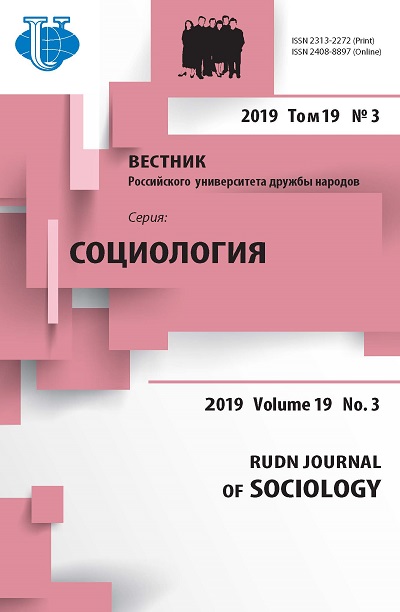Social-economic well-being and social tension in the Volga Region
- Authors: Zaitsev D.V.1, Surkova I.Y.2, Selivanova Y.V.3
-
Affiliations:
- Yuri Gagarin State Technical University of Saratov
- Petr Stolypin Povolzhsky Institute of Management - branch of the Russian Presidential Academy of National Economy and Public Administration
- Nikolay Chernyshevsky National Research State University of Saratov
- Issue: Vol 19, No 3 (2019)
- Pages: 494-502
- Section: Surveys, experiments, case studies
- URL: https://journals.rudn.ru/sociology/article/view/21683
- DOI: https://doi.org/10.22363/2313-2272-2019-19-3-494-502
- ID: 21683
Cite item
Full Text
Abstract
The article presents the results of the regional sociological study of the parameters of the social-economic well-being in the Volga Region. The well-being category consists of social satisfaction, trust, tension and security. Social well-being reflects the efficiency of the social system, its quality, the authorities’ competence in the development of social-economic processes and of a socially sensitive (accessible, comfortable) social environment. The study identified connections between social-economic well-being and employment, financial situation and the dynamics of migration; and empirically proved the low likelihood of ethnic or religious conflicts in the region, the high level of social well-being as mentioned by the younger generations and the average one among other age groups. The level of ethnic and confessional tension is influenced by the age of the respondents: a third of the younger generations and of the working age are more concerned with the criminal situation and with conflicts on national and religious grounds than pensioners. The able-bodied population of the Volga Region is concerned about their professional well-being due to perceiving migrants as competitors: in some cases, an increase in the share of migrants contributes to conflicts in the interethnic interaction. With an increase in the educational level the degree of social trust increases, which is a positive factor for the tolerant attitude towards others. In general, there are no reasons for concerns about ethnic conflicts in the region. The multi-ethnicity of the Russian society explains the relatively high tolerance to migrants despite many risk factors.
About the authors
D. V. Zaitsev
Yuri Gagarin State Technical University of Saratov
Author for correspondence.
Email: dvzsaratov@mail.ru
доктор социологических наук, профессор кафедры психологии и прикладной социологии Саратовского государственного технического университета
Politechnicheskaya St., 77, Saratov, Russia, 410015I. Yu. Surkova
Petr Stolypin Povolzhsky Institute of Management - branch of the Russian Presidential Academy of National Economy and Public Administration
Email: irina_surkova@mail.ru
доктор социологических наук, профессор кафедры управления персоналом Поволжского института управления им. П.А. Столыпина - филиала Российской академии народного хозяйства и государственной службы при Президенте Российской Федерации
Sobornaya St., 23/25, Saratov, Russia, 410031Yu. V. Selivanova
Nikolay Chernyshevsky National Research State University of Saratov
Email: juliaselivanova@mail.ru
доктор социологических наук, заведующая кафедрой коррекционной педагогики Саратовского государственного университета им. Н.Г. Чернышевского
Astrachanskaya St., 83, Saratov, Russia, 410600References
- Gareeva Z.K., Bilalova L.M., Ivanova O.M., Chernikova T.A. Sovremennye teorii sotsialnogo blagopoluchiya [Contemporary Theories of Social Well-Being]. Moscow; 2016 (In Russ.).
- Golikov A.A., Gordeev S.S., Davankov A.Yu., Kozlov V.N. Kontseptualnye osnovy dinamiki blagopoluchiya naseleniya v regione [Conceptual Bases of the Population Well-Being Dynamics in the Region]. Chelyabinsk; 2009 (In Russ.).
- Karabchuk T.S., Salnikova D.V. Obiektivnoe i subiektivnoe blagopoluchie: opyt sravnitelnogo analiza stran Tsentralnoj Azii, Rossii i Belarusi [Objective and subjective well-being: A comparative analysis of the countries of Central Asia, Russia and Belarus]. Sociologicheskie Issledovaniya. 2016; 5 (In Russ.).
- Kiselev V.I. Sotsialnaya napryazhennost kak sotsialno-filosofskaya kategoriya [Social tension as a social-philosophical category]. Izvestiya Rossijskogo Gosudarstvennogo Pedagogicheskogo Universiteta imeni A. Gertsena. 2013; 160 (In Russ.).
- Kostina E.Yu. Sotsialnoe blagopoluchie i sotsialnaya bezopasnost v usloviyah globalizatsii sovremennogo obshchestva [Social well-being and social security under the globalization of the contemporary society]. Universum: Obshchestvennye Nauki. 2015; 6 (In Russ.).
- Marenkova E.V. Opredelenie osnovnyh pokazatelej blagopoluchiya na osnove mezhdunarodnyh praktik [Defining key indicators of well-being based on international practices]. Ekonomika Rossii v XXI veke. Tomsk; 2015 (In Russ.).
- Merzlyakova I.V. Sotsialnoe blagopoluchie: teoretiko-metodologichesky analiz [Social well-being: A theoretical-methodological analysis]. Sibirsky Sociologichesky Vestnik. 2006; 1 (In Russ.).
- Narbut N.P., Trotsuk I.V. Sotsialnoe samochuvstvie molodezhi postsotsialisticheskih stran (na primere Rossii, Kazahstana i Chekhii): sravnitelnyj analiz strahov, nadezhd i opasenij [The social well-being of the post-socialist countries’ youth (on the example of Russia, Kazakhstan and Czech Republic): Comparative analysis of fears and hopes (Part 2)]. RUDN Journal of Sociology. 2018; 18 (2) (In Russ.).
- Petrovskaya Yu.A. Faktory sotsialnogo blagopoluchiya kak nauchnaya problema [Factors of social well-being as a scientific problem]. Vestnik Nizhegorodskogo Universiteta imeni N. Lobachevskogo. 2014; 4 (In Russ.).
- Popov E.A. Sotsialnoe blagopoluchie cheloveka v nauchnom diskurse [Social well-being in the scientific discourse]. Sotsiologiya v Sovremennom Mire: Nauka, Obrazovanie, Tvorchestvo. 2010; 2 (In Russ.).
- Sostoyanie prestupnosti v Rossii za yanvar-dekabr 2018 goda [The state of crime in Russia in January-December 2018]. https://genproc.gov.ru/upload/iblock/aab/Ezhemesyachnyj% 20sbornik%20dekabr'%202018.pdf (In Russ.).
- Yarskaya-Smirnova E.R., Yarskaya V.N. Sotsialnaya splochennost: napravleniya teoreticheskoj diskussii i perspektivy sotsialnoj politiki [Social cohesion: Directions of theoretical discussion and prospects for social policy]. Zhurnal Sociologii i Socialnoj Antropologii. 2014; 4 (In Russ.).
- Mahbub ul Inaugural, Sen A. Advancing, Sustaining Human Progress: From Concepts to Policies: Human Development Report. New York; 2010.
- Caplan B. Against the Human Development Index. The Library of Economics and Liberty. 2009; 5.
Supplementary files













